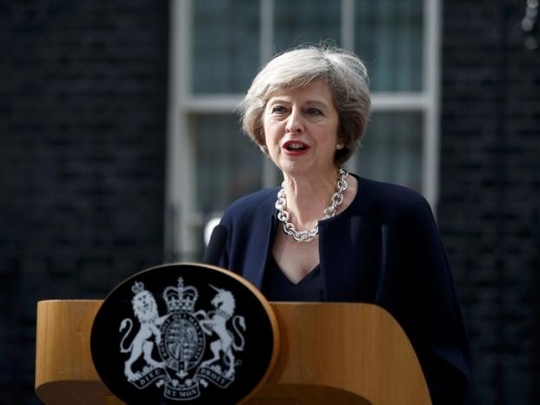
Dubai: British Prime Minister Theresa May will put the final Brexit deal to a vote in both houses of parliament, and plans to launch the two-year exit negotiation process by the end of March.
She has also committed to maintaining the common travel area with the Republic.
Outlining the UK’s plans for leaving the EU, May said the UK government would “make it a priority to deliver a practical solution” as quickly as possible to the question of the land border with the Irish state.
“Nobody wants to return to the borders of the past,” said the prime minister yesterday .
“The family ties and bonds of affection that unite our two countries mean that there will always be a special relationship between us.”
She added that maintaining the common travel area with the Republic would be “an important part of the talks”.
May has said plans for Brexit cannot allow the UK to remain in the European single market but that she will work to get an ambitious free trade agreement with the EU.
“This agreement should allow for the freest possible trade in goods and services between Britain and the EU’s member states... But I want to be clear: What I am proposing cannot mean membership of the single market.”
In her long-awaited speech in which she sought to define the UK’s future as a global player that aims to trade freely far beyond Europe, May said the final exit deal would be put to parliament for a vote.
That promise helped revive the pound on currency markets. Sterling, which has traded at the lowest levels against the US dollar for more than three decades, rose during May’s speech, hitting the day’s high.
Her announcement that her statement that Britain would leave the single market was by far the clearest indication she has ever given of her plans for the future, after months of criticism that she was not being sufficiently transparent.
“I want to be clear: What I am proposing cannot mean membership of the single market. Instead we seek the greatest possible access to it though a new comprehensive, bold and ambitious free trade agreement.
She said she hoped the UK’s exit from the EU would create a “stronger, fairer, more united and more outward-looking” country.
“People voted [for Brexit] with their eyes open, accepting that the road ahead would be uncertain at times... but would lead to a brighter future for their children and grandchildren and it is the job of this government to deliver it,” said May.
“I want us to be a truly global Britain; the best friend and neighbour to our European partners but a country that reaches beyond the borders of Europe too.
May has said she does not want partial membership of the EU.
“We seek a new and equal partnership — between an independent, self-governing, global Britain and our friends and allies in the EU.
“Not partial membership of the European Union, associate membership of the European Union, or anything that leaves us half in, half out. We do not seek to adopt a model already enjoyed by other countries. We do not seek to hold on to bits of membership as we leave. The United Kingdom is leaving the European Union and my job is to get the right deal for Britain.”
“I must be clear Britain wants to remain a good friend and neighbour to Europe,” she said. “Some voices are calling for a punitive deal, that punishes Britain and discourages other countries from taking the same path. That would be an act of calamitous self-harm for the countries of Europe and it would not be the act of a friend.
“I am equally clear that no deal for Britain is better than a bad deal for Britain.”
She said Brexit would also mean greater control on the number of people coming to the UK from Europe but added that EU nationals would still be welcome in the United Kingdom.
“We want to guarantee the rights of EU citizens who are already living in Britain and the rights of the British nationals in other member states as early as we can.
“We are leaving the European Union but we are not leaving Europe.”
She said she did not want Brexit to lead to the “unravelling” of the EU. “Our decision is not always understood by our friends and allies in Europe, and many fear the beginning of a great unravelling of the EU. But let me be clear. I do not want that to happen. It would not be in the best interest of Britain, it remains overwhelmingly and compellingly in Britain’s best national interest for the EU to succeed.”
She added that Brexit did not mean the UK would turn inwards and away from the world.
“The result of the referendum was not a decision to turn inward and retreat from the world, because Britain’s history and culture is profoundly internationalist.
“We are a European country and proud of our shared European heritage. But we are always a country that has looked beyond Europe to the wider world. That is why we are one of the most racially diverse countries in Europe.”












